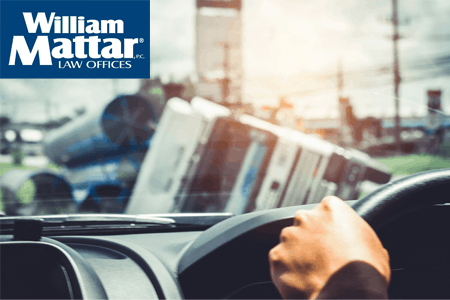Posted:
February 29, 2024
With few exceptions, 18-wheelers are the largest vehicles on the road. Not only are they usually the longest and highest; they’re also often the heaviest.
Fully loaded, the typical 18-wheeler—one with five axles and a 53-foot trailer—is allowed by law to weigh as much as 80,000 pounds fully loaded—heavier than a humpback whale. And there are bigger, heavier trucks than that. (See illustration below.)
The weight of big trucks alone makes them more dangerous than most other vehicles. Even under good road and weather conditions, a fully loaded truck traveling at highway speeds takes almost two football fields to stop. For more truck accident statistics, see the Federal Motor Carrier Safety Administration’s annual statistics, posted annually online.
Types of truck accidents
There are many types of trucks. Tow trucks. Dump trucks. Tank trucks. Flatbed trucks.
This blog post will focus on one kind: large, segmented, multiple-axle trucks consisting of a cab for the driver and a trailer for cargo—trucks more commonly known as 18-wheelers.
There are many types of 18-wheeler crashes, including:
- Jackknife: When an 18-wheeler jackknifes, the cab of the truck remains pointed in the same direction while the trailer swings, ending up at an angle to the cab. A jackknifing truck can collide with, trap, or crush other vehicles, causing a serious, multi-car accident. Such accidents occur most often on highways, where vehicles travel at higher speeds. Common causes of this type of accident include slippery roads, fast acceleration or braking, and mechanical issues.
- Rollover: When an 18-wheeler rolls or flips, it might roll several times, depending on the speed it was traveling when the rollover started. Vehicles in the way of a rolling 18-wheeler can be struck or crushed by the truck’s trailer. According to an analysis of truck rollover crashes, the top five causes are
-
- not slowing down on curves or off-ramps;
- the weight or nature of a truck’s load;
- worn or faulty brakes;
- dangerous road surfaces or intersections; and
- driver inattention, fatigue, or drowsiness.
- Wide turn: Big trucks make wide turns, especially to the right. An improperly executed wide turn, such as one that takes a truck into oncoming traffic, can cause a collision with another vehicle. Causes include failure to signal the turn or check blind spots.
- Blown tire: Large commercial trucks need tires that can sustain heavy loads; tires that are underinflated or heavily worn or subjected to potholes or other hazardous road conditions are at risk of blowing out and causing the truck driver to lose control and veer off the road or into other vehicles. Blown tires also can send debris flying, creating a hazard for other drivers, or lead to other types of 18-wheeler accidents, such as jackknifing crashes.
- Underride: Because tractor-trailers are higher than passenger vehicles, the latter can run underneath the former and become trapped, either on the rear or side of the truck’s trailer. A rear or side underride truck crash can occur when a car tailgates a truck or when visibility is low. Motorcycles also can underride large trucks. Such accidents often end in death or serious injuries such as traumatic brain injury or spinal cord damage for occupants of the smaller vehicle. A truckers’ failure to use underride guards or maintain an 18-wheeler’s brake lights also can cause an underride collision.
- Lost load: Shifting or falling can cause especially dangerous truck accidents. Trucks such as 18-wheelers transport tons of materials at high speeds over long distances, so truckers must follow regulations for securing their cargo, especially on highways. Cargo falling from a truck can land on a smaller vehicle or in the road, causing deadly accidents.
What are some common truck accident injuries?
Among the possible injuries and other effects of a truck crash are:
- Soft-tissue injuries such as the following:
- Damage to muscles, ligaments, joints, or tendons
- Neck, back, and shoulder pain that can hinder that hinder normal daily activities
- Sudden, violent movement of the head and/or neck
- Pain from pinched nerves or sciatica, which can be debilitating
- Injuries to the spinal cord, which can lead to paralysis
- Whiplash, which, besides pain in the neck, head, and shoulders, can lead to symptoms like those of a concussion, including fatigue, blurred or double vision, stiff and sore muscles, or restricted range of motion.
- Injuries to the head, chest, or limbs such as the following:
-
- Bruised or broken ribs caused by a seatbelt or collision with the dashboard
- Broken arms or legs
- A visible head injury such as a bruise or cut or an internal head injury such as the bruising and/or tearing of brain tissue and/or blood vessels characteristic of a concussion. Symptoms of brain injury can include headaches. One traumatic brain injury is a concussion, the symptoms of which include dizziness, blurred or double-vision, nausea, sensitivity to noise and/or light and mood, and changes in sleep or appetite. If you have any of these symptoms after being involved in a truck accident, see a medical professional. Unaddressed, a concussion can cause chronic issues and long-term health problems.
A truck accident might also cause mental health issues such as
- post-traumatic stress disorder, or PTSD, the signs of which might include flashbacks, nightmares or distressing memories of the event, and anxiety over reminders of the accident;
- mood, appetite, or sleep issues; or
Remember: Injuries suffered in an 18-wheeler accident may not be apparent at first, so, if you’re involved in such a crash, it is generally advisable to get medical attention as soon as possible.
What factors are unique to truck accidents?
Truck accidents can be unique in many ways.
For instance, many truck operators are subject to regulations limiting the number of hours they drive in a certain period—regulations that exist to keep roads safe from fatigued truckers. A truck driver who doesn’t follow these regulations and has an accident may be found negligent and therefore liable.
Commercial truck drivers have other safety considerations, too. They must
- leave extra room for braking and turns;
- not overload their trucks;
- use safety markers when parked on the side of the road; and
- make sure their cargo is secure.
Who can be liable in a truck accident?
Typically, more parties can figure into a truck accident than a car accident. Among those that may be liable include:
- the truck driver;
- the trucking company;
- the truck driver’s employer;
- the loading company;
- the manufacturer of the vehicle, its parts, or other equipment; or
- the owner of the truck.
Among the causes of a truck accident that might lead to a finding of liability against one of these parties are
- driver error or negligent behavior such as using drugs, texting, or ignoring traffic laws or trucking regulations;
- lax hiring practices that lead to the employment of improperly licensed or otherwise unqualified drivers;
- overly heavy or improperly secured loads that lead to tipping, jackknifing, rollover, or other mishaps;
- faulty tires that blow out, causing a truck to veer into oncoming traffic; or
- improper truck maintenance
Trucking companies are responsible for maintaining every truck in their fleet, and drivers must inspect the vehicle before driving it.
An experienced truck accident attorney can help identify all potentially liable parties and ensure you secure the evidence you need to obtain maximum compensation.
Hurt in a truck accident? Contact the William Mattar, P.C.
If you were injured in a commercial trucking accident, call William Mattar, P.C., today. Our truck accident lawyers have experience handling such cases and can help you navigate the laws and requirements surrounding your case and advocate for you to receive maximum compensation. To schedule a free case review, call our offices at 716-444-4444 or fill out our online form. We’re here for you, 24/7.








